If you use the Opera browser, you have probably heard of its built-in “free, no-log, unlimited” VPN service. It sounds too good to be true, right? It’s built into the browser, works on your desktop or mobile, and provides added privacy when browsing online.
While Opera may call it a “VPN,” it is technically a browser proxy service. You can think about it like a hidden tunnel just for your Opera browser traffic. It encrypts and reroutes only what happens in that browser. That means if you are checking emails in Outlook, downloading files with a different torrent client, or even browsing in another web browser, that traffic isn’t protected by Opera’s service.
Short answer to the question “Is the famous free VPN good enough?,” is no, it is not. It’s not more than a proxy.
A real and secure VPN service such as NordVPN creates and maintains an encrypted tunnel for all internet traffic from an entire device – all the apps, all the browsers—everything.
That’s not all. There is a lot to discover about Opera’s VPN service. Let’s see if Opera VPN is actually a good service. In this article, we will explore each and every aspect of this free VPN and let you know whether you should use it or not.
Opera VPN at a glance
| Rating | 4.8/10 |
| Price | Free, also has a Pro version |
| Servers | 3,000 in 30 countries |
| No-log policy | Some logs |
| Protocols | HTTPS |
| Compatible devices | Windows, Android, macOS, iOS, Linux |
| Streaming | Yes (limited) |
| Torrenting | Yes (limited) |
| Simultaneous connections | Only the device you use the browser on |
| Customer support | No customer support |
Opera VPN pros and cons
- User-friendly
- No data limitations
- Completely free
- Decent speeds
- No kill switch
- Doesn’t unblock major streaming sites like Amazon and Netflix
- Not enough security
- Limited features
Security and privacy: Is it good?
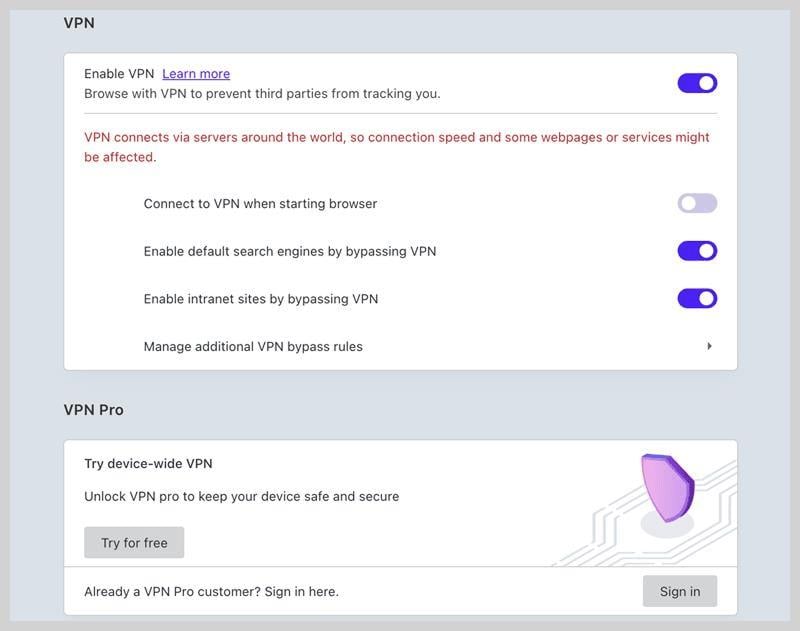
When Opera describes its VPN as “safe,” it is important to understand what this means. Opera VPN uses AES-256 encryption, which is considered the gold standard as it is exceptionally difficult for hackers to crack, which is good news.
However, the opera video in the free browser VPN technically uses the HTTPS (TLS) protocol. HTTPS does encrypt your connection, but it is an older protocol that could be susceptible to some forms of cyberattacks. So, this is a little concerning if your goal is comprehensive safety.
No-log policy
Opera promotes the no-log policy for the VPN product, noting in their documentation that they do not log your browsing activity or the location the connection is being made if you are using the free built-in VPN.
The free browser VPN had been independently audited by Deloitte, one of the largest (the “Big Four”) accounting firms in the world, as a testament to the no-log policy.
Deloitte noted that they thoroughly examined Opera’s VPN technology platform, the controls in place, and the documentation, and it reported back that the VPN service did not log, track, or store any of the users’ data. This external audit gives some level of comfort in being able to trust them on this no-log policy.
Based in a 14 Eyes Alliance country
While the VPN part may have that dazzling no-logs audit, when investigating Opera’s home base and ownership, new privacy concerns arise.
Opera is based in Norway, one of the 14 Eyes Alliances, which is an agreement between multiple countries to share intelligence.
For some privacy-oriented people, this can be a dealbreaker because it indicates that data might be demanded of allied governments. Plus, since Opera is partially owned by Chinese investors, it adds extra privacy concerns.
Regardless of the Deloitte audit of the VPN, the company structure and jurisdiction can change how we feel about the long-term safety of our data.
Opera VPN’s model of business
Although the VPN is audited as “no-log”, Opera openly states in its terms of use that it collects user data for promotional campaigns and advertising, and works with third parties such as Google and Facebook.
It could be easy to think that the “no-logs audit” means full privacy with Opera, but the audit is limited in scope to the VPN’s internal logging of browsing activity. Browsing still takes place related to the overall data logging from the Opera browser, which is part of their advertising model, that continues internally.
So, the totality of your contribution to privacy and overall threat model still depends on the ecosystem that is Opera, and not solely on the VPN function.
If you are not paying for the product, YOU are the product in the classic tale.
Privacy features
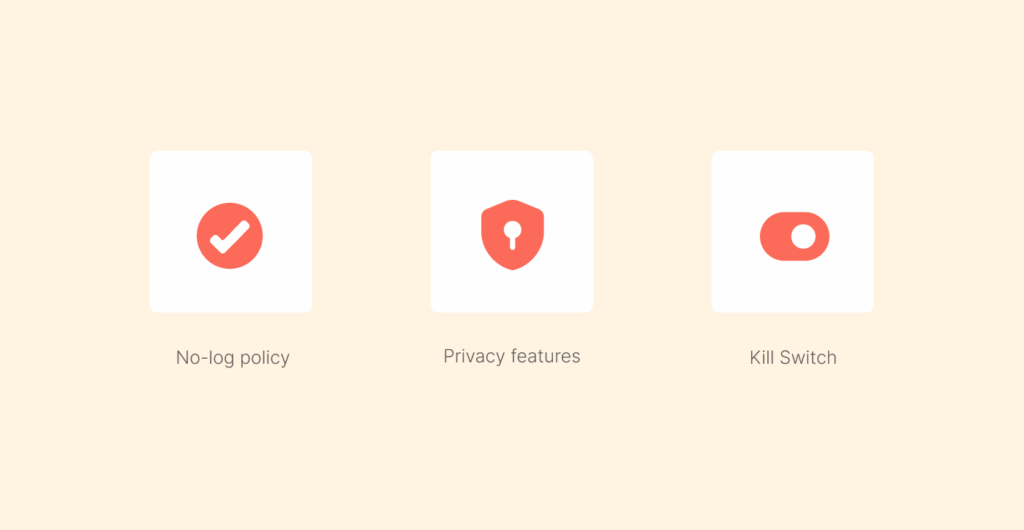
Opera VPN does not have some essential security features in dedicated VPNs.
The most important? No kill switch. A kill switch is like a safety net in case your VPN connection is interrupted. The tech automatically cuts your internet connection so your real IP address and unencrypted data will not be exposed.
Without it, if your Opera VPN connection acts up, your data could leak without any indicators.
It also does not offer split tunneling, which is a useful feature that allows you to choose which apps use the VPN and which connect directly to the internet. This diminishes our control over our encrypted traffic.
Speed and server network
Server count
According to Opera VPN, there are about 3,000 servers across 30 countries. That sounds good, but there is a catch: You cannot connect to specific countries with either (Free or Pro) service. You can only select servers from a broad list of regions like the Americas, Asia, or Europe, and not countries.
This limits users to unblock geoblocked services and content as they can’t connect to your desired location or region.
Speeds
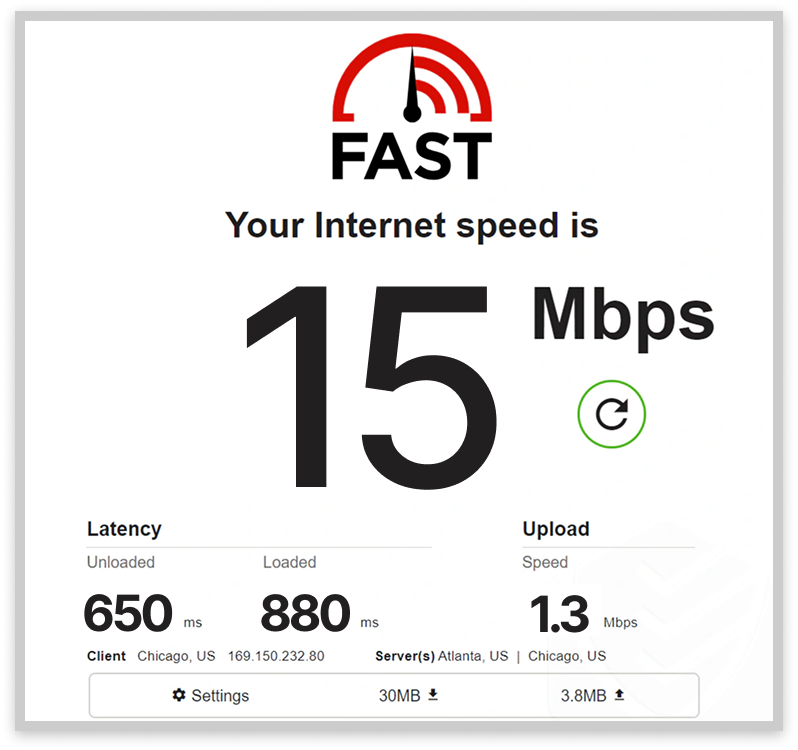
Regarding speed, Opera VPN’s free VPN performance contrasts with its Pro version.
During our testing, we found download speeds with Opera VPN to be good while its upload speeds are slow. For any VPN using encryption and rerouting to establish the VPN connection, upload speeds are often the feature that lags behind download speeds. However, Opera lags behind a little too much if you compare it with reputable VPNs like ExpressVPN or NordVPN.
Concerning Opera, the real difference occurs when we compare the free browser VPN, Opera VPN, to the Pro version of Opera VPN.
According to our tests, when connected to a good (nearby) location, Opera VPN Pro experienced a loss of speed of 17% on average.
That is fairly good, but in contrast, we find speed reductions to be 55% more when using the free browser VPN consistently.
Therefore, the free version is sufficient only for casual browsing, but Opera VPN Pro is the way to go if you want, particularly for anything that you are trying to connect to quickly.
To give you a clearer picture of what to expect, here are some speed test results:
Opera VPN speed test results
| Location/Region | Version | Download speed (Mbps) | Upload speed (Mbps) | Ping (ms) |
|---|---|---|---|---|
| Optimal Location | Pro | High (e.g., 83% of base) | Moderate | Low (e.g., 50ms) |
| Americas | Free | Low (e.g., <45% of base) | Low | High |
| Asia | Free | Low (e.g., <45% of base) | Low | High |
| Europe | Free | Low (e.g., <45% of base) | Low | High |
Streaming and geo-unblocking

If you’re using a VPN primarily to unblock geo-restricted streaming content, Opera VPN is, in general, not your best option. It has consistently underperformed in this regard, failing to overcome geo-blocks.
When we tested, Opera VPN ran into trouble with famous streaming services:
- Netflix: Didn’t work.
- Amazon: Didn’t work.
- Hulu: No.
- BBC iPlayer: Failed to unblock.
- HBO Max: No.
- YouTube: This was the only platform that consistently worked.
Why the struggle? Well, as we said, Opera VPN is a browser proxy and also has very limited servers. Streaming services are smart; they have advanced technology that detects and blocks VPN connections.
Opera VPN only allows you to select general regions (Americas, Asia, Europe), not specific countries or even cities. This eliminates the precision needed to bypass geo-blocks.
Anyhow, the fact that Opera VPN is technically a proxy makes it mostly ineffective for accessing content libraries that exist outside of your actual physical location.
Torrenting and gaming
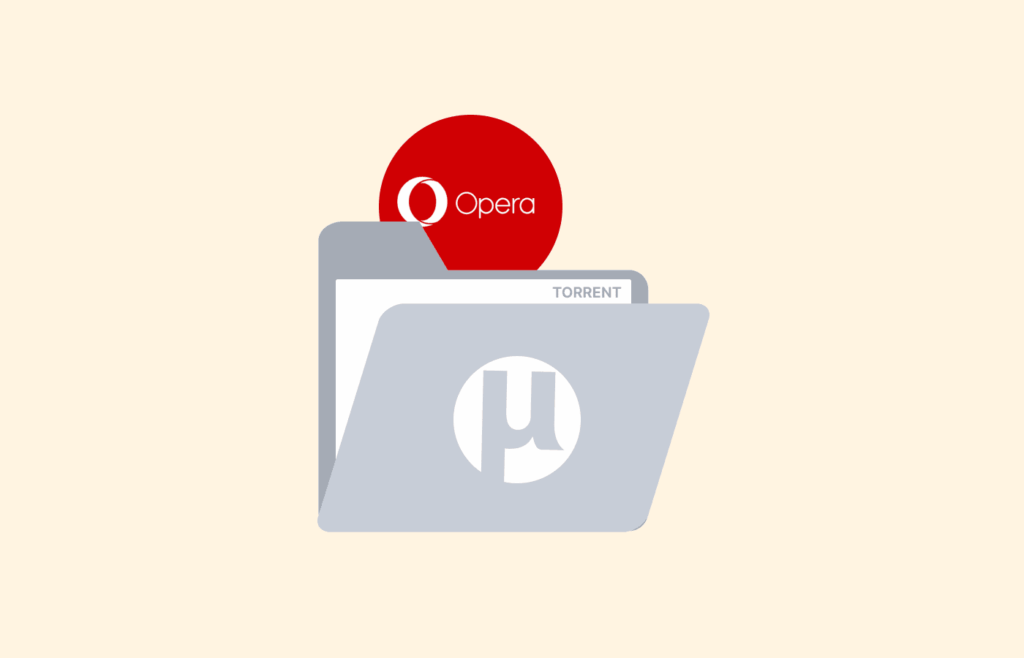
Is Opera VPN safe for torrenting?
Opera VPN is not a viable option for torrenting or any peer-to-peer (P2P) file sharing. This is not a matter of judgment; it is a hard limitation because Opera VPN is designed as a browser-only proxy. The real problem is that Opera VPN only encrypts and routes anything flowing through the Opera browser itself.
Almost all P2P file sharing or torrenting involves using standalone torrenting applications (for example, uTorrent, BitTorrent, or qBittorrent). Therefore, any P2P traffic that you create from temporary connections to these external applications would not be encrypted by Opera VPN.
This means that other peers on the P2P torrent swarm will know your IP address, which is dangerous. The risks involved include copyright owners attempting enforcement actions based simply on your being active on a torrent service.
Is Opera VPN good for gaming?
Regarding gaming, Opera VPN’s performance isn’t good, whether you’re using the free browser VPN or the paid Opera VPN Pro.
For the Pro version users, it tends to get good ping rates for the most part, which is essential to have a smooth and responsive online gaming experience.
While testing on nearby servers (in Europe and North America), for the most part, we had a lag-free experience. This is due to Opera VPN Pro Lightway protocol, providing faster speeds.
In contrast, the free Opera VPN isn’t typically the best option for gaming. At the time of testing, we experienced serious speed drops (more than 55%), with playable lag and unresponsiveness occurring in fast-paced games. Sometimes, the games won’t even load if you are on a remote server using the free app.
For casual gaming, if the goal is merely to access geo-restricted game content or to provide basic protection while you are gaming, Opera VPN Pro fits well.
However, if you are a serious gamer or a competitive gamer and you need consistent low latency, high speeds, and possibly specific add-on gaming features, a dedicated gaming VPN would be a preferred option. You can select one of those from our this article here.
User experience: Getting started with Opera VPN
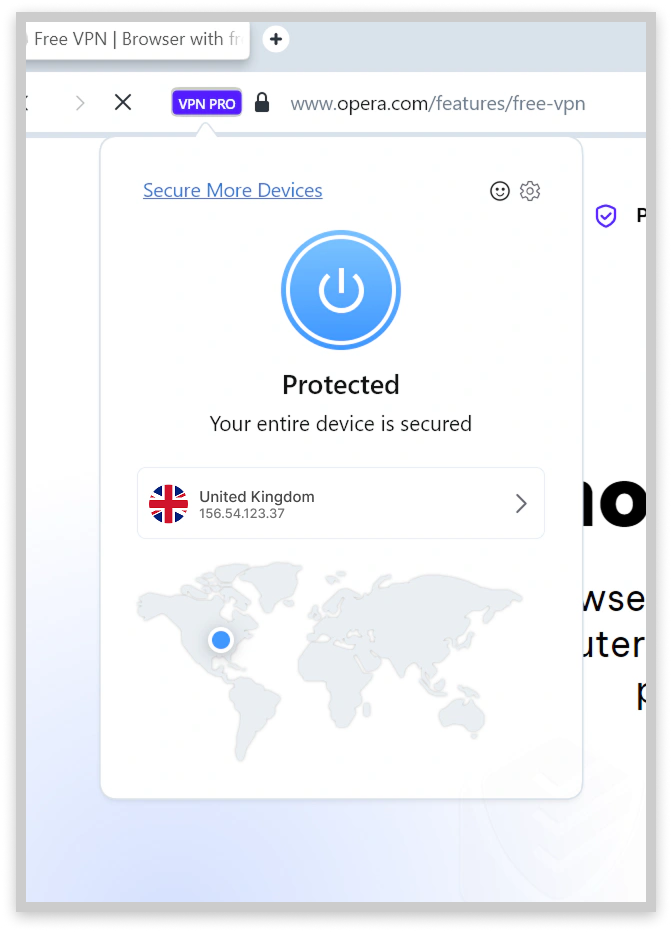
The best and probably the only good thing about Opera VPN is that it is easy to use. You do not need to download a standalone VPN app, as Opera VPN is incorporated in the Opera browser.
There are no additional add-ons or extensions, which makes it a whole lot easier to use.
It is also available anywhere the Opera browser is available: Personal computers, Mac, and iOS and Android mobile devices.
So, how to use Opera VPN? Let’s get to that.
On Windows and Mac
1. Start Opera. You can launch the Opera Browser through:
- In Windows, click the Start icon. From your Start menu, search for Opera.
- In macOS, open Applications, find and click Opera.
2. Go to settings:
- In Windows and Linux, click the red “O” in the top-left corner of the browser and select “Settings,” or click “Alt+P.”
- In macOS, click on the “Opera” menu at the top of the screen and select “Preferences”.
3. Find ‘Privacy & Security.’ In the left-hand sidebar, select “Privacy and security”.
4. Expand advanced. Scroll down to the end, and there you’ll see “Advanced.” Click it.
5. Select “Enable VPN”. Under the “VPN” heading, you will see “Enable VPN”. Toggle the switch to the on position.
6. Quick Access: After enabling it, you’ll see a small VPN badge in your address bar. Click the badge to toggle the VPN on or off, select where in the world you want a broad virtual location (Americas, Asia, or Europe), and see how much data you’ve consumed that day.
7. Configure (Optional): In settings, you can also tell Opera to bypass the VPN altogether for your default search engines or specific intranet sites.
Android or iOS
- Open Opera app: Open the Opera browser app on your Android or iOS device.
- Tap profile icon: Tap the profile icon (a circle with a person in it), which is normally on the top-left or bottom-right of the screen.
- Activate VPN: In the menu that appears, tap the “VPN” option. This automatically connects you to the fastest VPN server.
- Confirm connection: Your profile icon also changes color (often blue) and status changes to “VPN On.”
Pricing
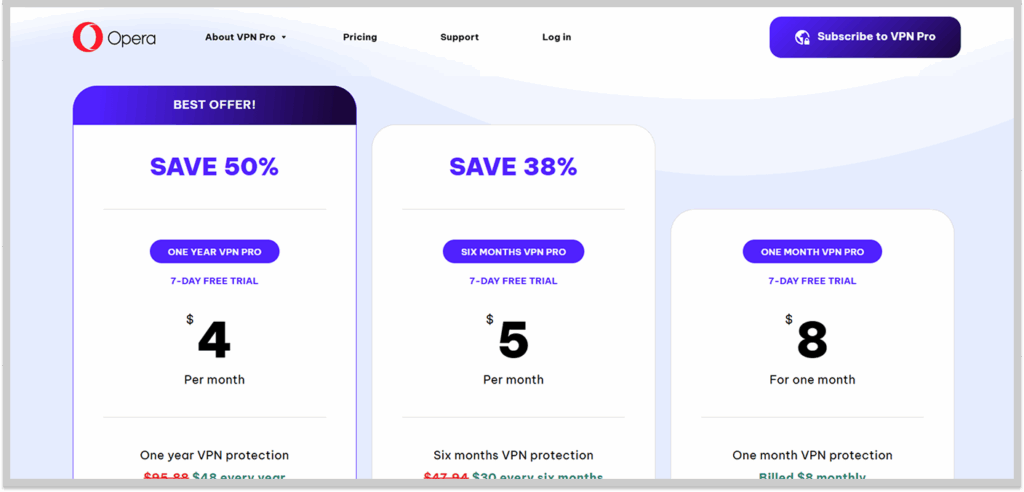
In 2016, Opera launched a VPN a completely free from the outset within its browser (offering unlimited data). The company first offered the service as a standalone app and later integrated it directly into its desktop and mobile browsers. Things have changed now.
The free version of Opera VPN that is built into the browser is totally free. However, it has a paid one as well. The Pro version costs:
- 1-month plan – $8.00 per month
- 1-year plan – $4.00 per month (billed after 1 year)
When thinking about Opera VPN Pro pricing, it is worth comparing it to other reputable, full-featured VPN services in consideration of pricing and features.
Although $4.00 per month on the yearly plan is reasonable, we need to consider whether Opera VPN Pro’s features are sufficient for us. Most of the VPN services have more server locations, additional security (such as a kill switch), or better streaming/torrenting performance for a similar price.
Here’s a side-by-side comparison to help you decide:
Opera VPN Free vs. Pro comparison
| Feature/Aspect | Opera VPN Free | Opera VPN Pro |
|---|---|---|
| Cost | Free | $8.00/month or $4.00/month (billed annually) |
| Device-wide protection | No (browser-only proxy) | Yes (full device protection) |
| VPN protocol | HTTPS (TLS) | Lightway |
| Server locations | 3 broad regions (Americas, Asia, Europe) | 48 countries |
| Speed performance | Significant speed drops (>50%) | Much faster (approx. 9% drop on optimal) |
| Simultaneous devices | 1 (within browser) | Up to 6 |
| Kill switch | No | No (implied, as no mention of it for Pro) |
| Split tunneling | No | No (implied, as no mention of it for Pro) |
| Torrenting support | No (browser-only) | No (not designed for it, no specific features) |
| Streaming performance | Poor (only YouTube worked) | Limited (no specific claims of unblocking major services) |
| No-logs Audit | Yes (for browser activity) | Yes (claimed as no-log service) |
This table highlights the advantages of upgrading to Opera VPN Pro, such as wide-device protection, a larger server network, and overall better speeds.
Opera VPN Free vs. Opera VPN Pro: What’s the real deal?
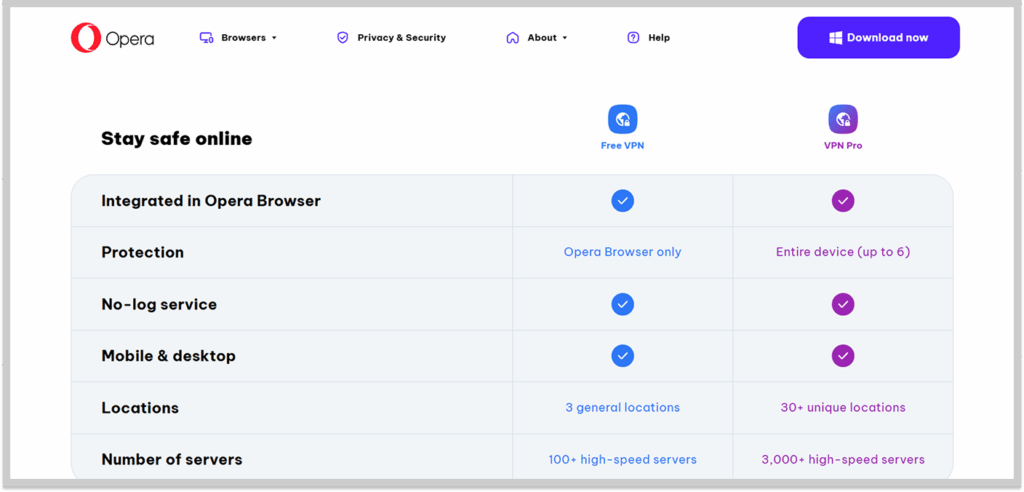
Opera actually has two types of VPN offerings: one is a free built-in Opera VPN, and the other is the paid Opera VPN Pro, which consists of a subscription service.
Understanding the differences is key to figuring out which, if any, is right for you.
Opera VPN Free
This is the free built-in Opera VPN that we are reviewing is available in the Opera Browser on desktop, iOS, and Android.
The best part about Opera VPN (free) is that it is free, unlimited, has no subscriptions, no payments, no login, and no other extensions. However, it has a major limitation since it is merely a browser proxy, only securing and encrypting internet activity in the Opera browser.
This means that any traffic that occurs as a result of apps you load on your device will not be protected (both in the browser and outside of it).
Additionally, the free version provides a very limited choice of three general virtual locations (Americas, Asia, or Europe).
The free browser VPN typically sustains severe drops in speed by more than 50% compared to a direct connection.
Lastly, the Opera free browser VPN has an independently confirmed no-log policy concerning browser activity. The policy is validated by Deloitte, which provides some comfort with respect to our browsing data when using the Zoom platform in-browser.
Opera VPN Pro
Being a paid version, Opera VPN Pro promises “full, device-wide VPN protection.” This means it encrypts all of the internet traffic of your entire device, and not just traffic that occurs within the Opera browser, creating a much more effective VPN solution.
It allows you to secure 6 devices simultaneously. The Pro version uses the new Lightway protocol, which has improved security, user privacy, speeds, and even battery life.
Lightway is open-source and underwent an independent security audit. Opera VPN Pro has a much larger network of servers, with access to private servers in 48 different countries. The initial selection of locations allows you granular geo-unblocking options.
In terms of performance, Opera VPN Pro is faster than the free version, with some speed drops, used in optimal locations, observed at around 9%. So, like the free version, Opera VPN Pro also advertises itself as “a secure, no-log service”. However, if you are paying $4.99 per month, you can have a better option at this price.
When Opera VPN isn’t enough: Comparing it with other market giants

While Opera VPN, especially the free, browser-based version, is a useful and basic privacy layer for light browsing, we have to recognize its limitations.
For users who want strong security, full-device application privacy, reliable access to geo-restricted streaming services, or torrenting safely, Opera VPN isn’t a good option.
As a browser proxy without the core VPN function of a kill switch, it can hardly offer the protection or the features that a privacy enthusiast wants from a real Virtual Private Network.
If you want to be completely safe online, you should consider fully-featured dedicated VPN providers, like NordVPN or ExpressVPN.
They provide large server networks, unblock almost all streaming platforms, and add top security features like kill switches to protect your valuable data, even if the VPN drops its connection.
That said, recommended providers in the VPN industry like NordVPN, Surfshark, and Proton VPN will most likely outperform Opera VPN, as they provide:
- Large-traffic built networks: Opera VPN provides a much smaller network of servers, meaning you will have limited options to change servers. Premium service, on the other hand, has a large server pool.
- Enhanced security features: Unlike Opera VPN, they provide malware protection, a kill switch, encrypted VPN protection (not just HTTPS), and even offer extra features like ad-blocking and multi-hop servers.
- Independent, audited no-log policies: Most major VPN providers regularly undergo independent audits to substantiate their no-log claims, which makes us trust them much more. That’s not the thing with Opera VPN.
- Better streaming and torrenting options: Most premium providers have substantial support for streaming platforms and secure, high-speed P2P file sharing and torrenting.
- Reliable customer support: They have 24/7 support, extensive knowledge bases, and either live or email support for as quickly as you need assistance.
Comparison between Opera VPN and NordVPN
| Feature | Opera VPN | NordVPN |
|---|---|---|
| Our rating | 4.8/10 | 9.8/10 |
| Overall rank | Low | High |
| Servers | 3,000 servers in 30 countries (broad regions) | Over 8,000 servers in 120+ countries (specific) |
| No-Logs policy | Yes (for browser activity, audited for free version) | Yes (audited) |
| Price | Free (browser VPN); Pro: $8.00/mo or $4.00/mo (billed annually) | Varies (typically $3-5/mo for long-term plans) |
| VPN protocols | HTTPS (TLS) ; Lightway (Pro) | OpenVPN, NordLynx, IKEv2/IPsec |
| Streaming services | Limited (only YouTube worked in tests) | Excellent (Netflix, Hulu, BBC iPlayer, etc.) |
| Platforms | Opera Browser (desktop, Android) | Windows, macOS, Linux, Android, iOS, Routers, etc. |
| Simultaneous connections | 1 (free browser VPN); Up to 6 (Pro) | Up to 10 |
| Support | No dedicated customer support | 24/7 Live Chat, Email |
FAQs
Opera VPN is a browser proxy, not a full VPN, protecting only in-browser traffic. While its free version has an audited no-logs policy for browsing, the company still collects data for ads. Moreover, it lacks a kill switch and other safety tools, meaning it doesn’t offer comprehensive device-wide safety.
Opera VPN Pro is a VPN service that has a “no-log” service for your VPN traffic, not identified since it has a formal audit. The Opera browser itself collects your usage data for advertising. So, while the VPN is securing your connection with Opera, the browser may track your overall activities.
Opera’s VPN is fully integrated into the Opera browser.
1. On PC or Mac, simply enable this feature in Settings > Privacy and security > Advanced.
2. On Android or iOS devices, click the profile icon, then click the “VPN” menu option in the app.
After you have selected a VPN, it connects straight away, providing you with free, easy, and private access.
The basic Opera VPN that comes with the browser is completely free and unlimited. However, Opera VPN Pro costs $8.00/month, or $4.00/month when billed yearly, and offers a paid upgrade to much more overall security.
